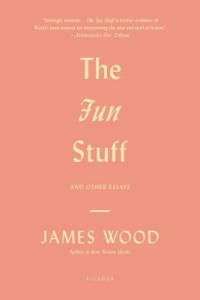 In starting this blog, and in writing literary criticism more generally, I had in mind an ideal, a mode of writing to aspire to based on the critical writings that had given me the most pleasure. James Wood is that ideal. Reading him provokes a contradictory experience: first, a feeling of total inadequacy as you marvel at Wood’s acumen, the sheer scope of his learning and the power of his memory to draw on what he has read, from Tacitus to contemporary Czechoslovakian writers; this is followed by a kind of elation, a rejoicing that we, too, can share in his learning, see as he sees, read as he reads, if only for the duration of a book or essay. In other words, this is literary criticism as it should be, not an assault or imposition of the critic’s values on the text but the careful sussing out of meaning, an examination of the author’s failures and successes in an attempt to answer the ultimate question
In starting this blog, and in writing literary criticism more generally, I had in mind an ideal, a mode of writing to aspire to based on the critical writings that had given me the most pleasure. James Wood is that ideal. Reading him provokes a contradictory experience: first, a feeling of total inadequacy as you marvel at Wood’s acumen, the sheer scope of his learning and the power of his memory to draw on what he has read, from Tacitus to contemporary Czechoslovakian writers; this is followed by a kind of elation, a rejoicing that we, too, can share in his learning, see as he sees, read as he reads, if only for the duration of a book or essay. In other words, this is literary criticism as it should be, not an assault or imposition of the critic’s values on the text but the careful sussing out of meaning, an examination of the author’s failures and successes in an attempt to answer the ultimate question
The Fun Stuff is a collection of Wood’s essays and book reviews, most of them culled from the pages of the New Yorker or Times Literary Supplement. The collection begins with the eponymous essay, which turns out to be an homage to Keith Moon, drummer of The Who. Wood describes his middle class upbringing, complete with the requisite education in classical music that he cannot bring himself to say outright was a stifling experience for him. Thus when he observes children on their way to school, music cases strapped to their shoulders “like diligent coffins,” he can claim to know the “weight of their obedience,” but quickly follows this up with a qualifier about the subtle and lasting joys of classical music. Ultimately, however, Wood discovers what all school children discover: “subtlety is not rebellion, and subtlety is not freedom, and sometimes it is rebellious freedom that one wants, and only rock music can deliver it.”
The remaining essays cover contemporary writers like Ian McEwan, Cormac McCarthy, Geoff Dyer, Kazuo Ishiguro, Paul Auster (who is particularly savaged), as well as literary staples like Thomas Hardy, Mikhail Lermontov, Tolstoy and Orwell. The piece on Orwell is particularly illuminating, largely because it is impossible to write about him without at the same time revealing something about your own politics in the process. Here, for example, we learn of Wood’s upbringing, his scholarship to Eton and the way in which his peers evaluated him based on how many servants his family kept, how many rooms there were in his house or which neighborhood of London his family lived in.
I’ve arrived at Wood circuitously, beginning with his stratospheric reputation and followed by a series of interviews and lectures found on YouTube before finally picking up this book. In person, he seems self-effacing, uncertain, apologetic for the very space he occupies in the room (see short interview, for example). By contrast, in his writing he is unapologetic, decisive and, above all, so determined to champion his aesthetic standards that he does not hesitate to apply them equally to the emerging and the canonical writer alike. Much of his strength as a critic, I surmise, comes from this principled objectivity. The rest simply comes from an unequalled literary acuity. He is, in Cynthia Ozick’s words, our best critic.